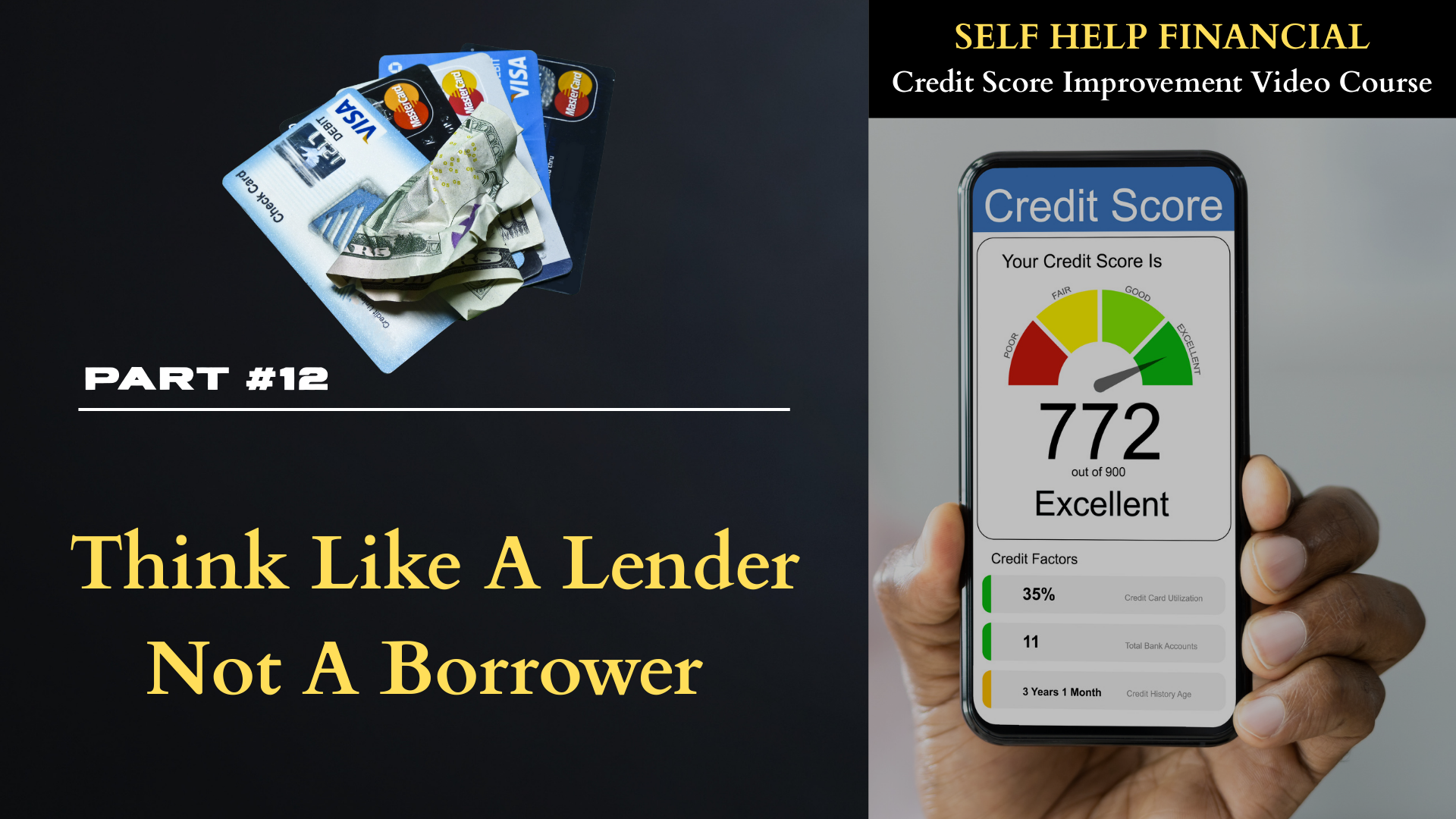Dealing With Your Credit During Financially Difficult Times
Big, bad problems can happen to you - bankruptcies, divorces, lawsuits, non-payment of taxes. These are big problems that can affect your credit score in a big way. If you have faced a large problem that has ruined your credit, you need to take action fast and work consistently to boost your FICO score:
You should have enough savings to pay for the loan before you do this. Pay back the loan quickly. It will not hugely boost your credit score, but it will show lenders that you are having an easier time paying your bills. Taking out a small loan you can repay is part of the slow process of reestablishing good credit following a big financial problem.
If you need credit following a big problem with your credit score, secured credit may be something you can qualify for. You can use this secured credit to reestablish a good credit rating so that you will qualify for other loans in the future. You may have to pay slightly higher interest if your credit score is quite low, but in the long-term repaying this type of loan can improve your credit score.
In the long run, you can always refinance your loan to take advantage of a better rate once your credit score improves.
When you meet with a lender in person, you force them to stop looking at you as a credit score number and make them look at you as an entire person. This can be a huge advantage for you (especially if you are personable) and can help you get the loan your credit score does not completely qualify you for.
In short, bankruptcy is a legal proceeding that either forgives you of your debts or allows you to pay off just a small fraction of your debt. It will nearly ruin your credit rating at first, but it will also allow you to dig out from overwhelming debt and reestablish a good credit rating again after years. A bankruptcy will no longer show up on your credit report after ten years.
If you are very seriously in debt and have no way of repaying your bills, a bankruptcy can help you by stopping collection agencies and other problems. Also, if you have been very negligent in paying your large debts, your credit rating has already likely suffered greatly.
While a bankruptcy will depress it even further, at least it will give you the chance to repair your credit by giving you a "clean slate" free from large debts.
In fact, major problems such as a bankruptcy will remain on your credit report for seven or ten years, affecting your credit score. Even if your credit problems stem from simply not paying bills on time, it will take some time for the mark to fade from your credit report and for your credit score to reflect your better repayment.
Paying off your debts and resolving problems will help your credit score (since overdue accounts will be marked as "paid" on your credit report), but only time will remove the mark of the problems from your record entirely. This means that if you have faced a major setback such as a bankruptcy, you may have to wait to get the best interest rates on larger purchases. The good news is that the further away you are from a major financial problem, the less dire it appears.
For example, if you have declared bankruptcy, you can expect it to have a huge impact on your credit score for the first two years, during which time you will have a hard time getting any credit at all.
However, after two or three years, if you have been paying your bills on time, then the bankruptcy from two years ago will matter less because you have been rebuilding your credit. Your credit will still suffer - but you will slowly be starting to work your way out of the credit problem. Persistence and good financial habits will get you there.
This means that if you plan on making a major purchase (such as a house or car) that may require a loan, you should start working on improving your credit well in advance - even years in advance - of your actual purchase. This is because you simply will not have enough time to radically alter your credit score in time if you wait too long.
Even if your credit score is already fairly good, you may need to give yourself several months of time to boost your credit rating enough to get the best loan rates.
Everybody suffers from financial difficulties once in a while and every professional in the field of finance - from loan managers to bankers - knows this. Plus, financial professionals - including lenders - want your business and so are willing to work with you to help you solve your problems.
If you have had a financial problem, or are even headed towards one, start working on repairing the situation right away. If your credit is suffering because you have not paid some bills, for example, don't make it worse by waiting until you are reported to a collection agency (by which time your credit rating will have taken an even worse hit). Instead, work on paying off your bills or arranging a payment schedule right away.
-Do you develop credit problems because you overspend while shopping? -Are you so disorganized that you forget to pay bills? -Are your bills simply too large for your current income? -Do you routinely get overcharged for things and fail to notice until much later?
Knowing what your mistakes are and finding solutions to the problems can go a long way towards helping you develop a good credit risk rating!
If You Have Bad Credit, Establish Better Credit By Taking Out Credit And Repaying It Quickly!
If you have terrible credit following a bankruptcy or other major financial upheaval, you may need to get back into a good credit rating by taking out a loan you can handle. Make an appointment to see your bank or bad credit lender a few months or years after the problem in question and arrange for a small loan.You should have enough savings to pay for the loan before you do this. Pay back the loan quickly. It will not hugely boost your credit score, but it will show lenders that you are having an easier time paying your bills. Taking out a small loan you can repay is part of the slow process of reestablishing good credit following a big financial problem.
Try Secured Credit If You Cannot Qualify For Other Types Of Credit!
Secured credit is credit or a loan which uses something as collateral. In some cases, this could be an asset like a house. In some cases, this collateral could be money frozen in an account by the bank for just such a purchase.If you need credit following a big problem with your credit score, secured credit may be something you can qualify for. You can use this secured credit to reestablish a good credit rating so that you will qualify for other loans in the future. You may have to pay slightly higher interest if your credit score is quite low, but in the long-term repaying this type of loan can improve your credit score.
Look For Loans That Are For Bad Credit Risks!
If your credit score is bad but you need a loan, consider services that cater to people with poor credit scores. These companies know that some creditors with poor credit scores will still make their payments on time, so they are willing to consider bad credit borrowers when other companies would reject them. You may have to deal with higher interest rates, but choosing a bad credit lender can go a long way to ensuring that your credit score won't disqualify you for a loan.In the long run, you can always refinance your loan to take advantage of a better rate once your credit score improves.
Consider Speaking To Lenders Face-To-Face If You Have A Bad Credit Score!
If you apply for a loan over the telephone or online, your credit score will count the most, because that is all the lender will likely look at before getting back to you with a quote. If you have bad credit but still need a loan, meeting with a lender face to face is your best bet because an actual meeting allows a lender to get an impression of you, and allows you to explain the problems you have had in the past and the things you are doing now to make yourself a better credit risk.When you meet with a lender in person, you force them to stop looking at you as a credit score number and make them look at you as an entire person. This can be a huge advantage for you (especially if you are personable) and can help you get the loan your credit score does not completely qualify you for.
Don't Overlook Bankruptcy!
A bankruptcy will affect your credit score more than just about anything. Worse, it will affect it for many years. In the first few years after a bankruptcy, you may not be able to get loans at all.In short, bankruptcy is a legal proceeding that either forgives you of your debts or allows you to pay off just a small fraction of your debt. It will nearly ruin your credit rating at first, but it will also allow you to dig out from overwhelming debt and reestablish a good credit rating again after years. A bankruptcy will no longer show up on your credit report after ten years.
If you are very seriously in debt and have no way of repaying your bills, a bankruptcy can help you by stopping collection agencies and other problems. Also, if you have been very negligent in paying your large debts, your credit rating has already likely suffered greatly.
While a bankruptcy will depress it even further, at least it will give you the chance to repair your credit by giving you a "clean slate" free from large debts.
Don't Choose Bankruptcy As An Easy Out!
Bankruptcy is a serious credit problem - it is not just a "ding" on your credit report - it is a huge red flag to lenders. After a bankruptcy, you will be ineligible for credit cards, many types of credit and will even be told what you can and cannot buy. The procedure of bankruptcy can also be draining. Bankruptcy should only be chosen as a last option if you really require your debts to be forgiven because you have no way of repaying them.Give It Time!
Many people believe that simply paying off debts will improve their credit score at once. This is not true, unfortunately. If you have experienced a bankruptcy, have been reported to a collection agency, or have had charge-offs, the record will remain on your credit report - even after you have repaid your debts and resolved the problem.In fact, major problems such as a bankruptcy will remain on your credit report for seven or ten years, affecting your credit score. Even if your credit problems stem from simply not paying bills on time, it will take some time for the mark to fade from your credit report and for your credit score to reflect your better repayment.
Paying off your debts and resolving problems will help your credit score (since overdue accounts will be marked as "paid" on your credit report), but only time will remove the mark of the problems from your record entirely. This means that if you have faced a major setback such as a bankruptcy, you may have to wait to get the best interest rates on larger purchases. The good news is that the further away you are from a major financial problem, the less dire it appears.
For example, if you have declared bankruptcy, you can expect it to have a huge impact on your credit score for the first two years, during which time you will have a hard time getting any credit at all.
However, after two or three years, if you have been paying your bills on time, then the bankruptcy from two years ago will matter less because you have been rebuilding your credit. Your credit will still suffer - but you will slowly be starting to work your way out of the credit problem. Persistence and good financial habits will get you there.
This means that if you plan on making a major purchase (such as a house or car) that may require a loan, you should start working on improving your credit well in advance - even years in advance - of your actual purchase. This is because you simply will not have enough time to radically alter your credit score in time if you wait too long.
Even if your credit score is already fairly good, you may need to give yourself several months of time to boost your credit rating enough to get the best loan rates.
Start Repairing Your Credit Right Away!
A big financial problem is an emotional as well as a monetary burden. Plenty of debtors feel so terrible about their financial problems and so uncertain about their money that they go into deep denial, refusing to think or work on their financial problems. This is likely to only make the problem worse.Everybody suffers from financial difficulties once in a while and every professional in the field of finance - from loan managers to bankers - knows this. Plus, financial professionals - including lenders - want your business and so are willing to work with you to help you solve your problems.
If you have had a financial problem, or are even headed towards one, start working on repairing the situation right away. If your credit is suffering because you have not paid some bills, for example, don't make it worse by waiting until you are reported to a collection agency (by which time your credit rating will have taken an even worse hit). Instead, work on paying off your bills or arranging a payment schedule right away.
Learn From Your Mistakes!
Everyone makes some credit mistakes sooner or later - it is very rare for someone to go through their entire lives without at least a few dings on their credit risk record. Don't beat yourself up over your mistakes - even if they are large ones. Instead, learn from your mistakes by analyzing them. Think of your credit mistakes as clues which can help you in the future to avoid the same problems:-Do you develop credit problems because you overspend while shopping? -Are you so disorganized that you forget to pay bills? -Are your bills simply too large for your current income? -Do you routinely get overcharged for things and fail to notice until much later?
Knowing what your mistakes are and finding solutions to the problems can go a long way towards helping you develop a good credit risk rating!
Click On An Image Below To Watch More Free Videos Now!
DISCLAIMER:
The information provided in these videos are for educational purposes only. Always consult with a professional before making significant financial decisions. We do not guarantee any specific credit score improvements and you are solely responsible for your financial decisions, and any outcomes that result from the application of strategies found in these videos!
The information provided in these videos are for educational purposes only. Always consult with a professional before making significant financial decisions. We do not guarantee any specific credit score improvements and you are solely responsible for your financial decisions, and any outcomes that result from the application of strategies found in these videos!
© 2026 Self Help Financial All Rights Reserved











